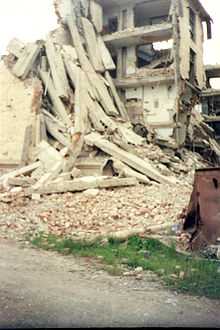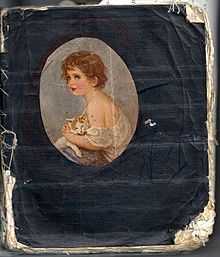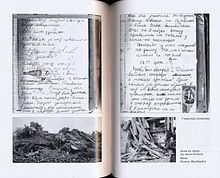Polina Zherebtsova
| Polina Zherebtsova | |
|---|---|
|
Polina Zherebtsova, Germany Lit.Cologne 2015 | |
| Born |
March 20, 1985 Grozny, North Caucasus |
Polina Zherebtsova (Russian: Жеребцова Полина, March 20, 1985, Grozny, USSR) a documentarian, poet and author of the famous diaries Ant in a Glass Jar, covering her childhood, adolescence and youth that witnessed three Chechen wars.[1] Since 2012, she has begun to work as a journalist. She is a member of PEN International and the Union of Journalists of Russia. She has been awarded the Janusz Korczak international prize in Jerusalem in two categories (narrative and documentary prose). In 2012, she was awarded The Andrei Sakharov Award “For Journalism as an Act of Conscience”. Andrei Sakharov [2] She was born in a mixed ethnic family in Grozny, Chechen-Ingush Autonomous Republic, USSR. Since 2013, she has been living in Finland.
.jpg)


Author of the Report on war crimes in Chechnya in 1994-2004. ru. [3] eng.[4]
Polina began keeping her diary when she was 9 years old, at the start of the First Chechen War. She was still living in Grozny when the Second Chechen War began. On October 21, 1999, the market in Grozny where she was helping her mother sell newspapers was shelled, and Polina was moderately wounded.
Politkovskaya described war as a journalist from the outside in. Polina Zherebtsova writes about war from inside the heart of darkness.
Der Spiegel №10 /2015.[5]
Biography

Polina's father was a lawyer, who died when Polina was a child. Her mother, Elena, worked as a senior goods manager at a large company. She devoted her spare time to her daughter's education. Polina grew in a family that equally revered books like the Torah, the Bible and the Koran. Since childhood, she had studied religion, history, and philosophy.
Polina Zherebtsova was born in 1985 in Grozny and lived there for almost twenty years. She considers herself a cosmopolitan as she has multi-national ancestry. Polina’s father died when she was very young. Polina’s maternal grandfather Zherebtsov Anatoly Pavlovich, with whom she had formed a friendship, worked in Grozny for more than 25 years as a TV journalist-cameraman. Polina’s maternal grandmother was a professional artist. Paternal grandfather was an actor and musician. Polina’s paternal grandmother was a professional actress.
In 1994, Polina started keeping a diary in which she recorded what was happening around her. Her diaries cover her childhood, adolescence and youth that witnessed three Chechen wars. School, first love, quarrels with parents, what is familiar to any teenager, side by side in the life of Polina with the bombing, starvation, devastation and poverty. On October 21 of 1999 she was wounded by shrapnel during a missile attack on Grozny Central Market.
Since 2002, she has begun to work as a journalist. In 2003-2004, she studied at the School of Correspondents.
In 2004, Chechen diary was completed when the author was 19 years old.
In 2006, she has been awarded the Janusz Korczak international prize in Jerusalem in two categories (narrative and documentary prose). Competition theme was "terror and children."
Since 2007, she has been a member of the Russian Union of Journalists.
In 2010, she graduated from the Stavropol North Caucasus University with a degree in General Psychology.
In 2011, "Polina Zherebtsova's Journal: Chechnya 1999-2002" was published.
Since 2012, she has been a member of PEN International.
In 2012, she was awarded The Andrei Sakharov Award “For Journalism as an Act of Conscience”.
In 2013, she has received a political asylum in Finland.
In 2014, "Ant in a Glass Jar" was published.
The First Chechen War
The first military campaign started in 1994. At the beginning of the war, Zherebtsova's grandfather, Anatoly, was killed by shells from airplanes. Zherebtsova made the first serious entries in her diary at this time. She kept the diary to herself, and wrote about humorous and sad moments in the life of her neighbors and friends.[1] Because of the name of her grandfather's stepfather, Zherebtsov, Polina was subjected to repeated insults at school.
The Second Chechen War

In 1999 a new round of war in Grozny began in the North Caucasus, when Polina was 14 years old, which she describes in her diary.
While helping her mother trade in the central market in Grozny after high school, Polina was wounded in her leg on October 21, 1999 when the marketplace was shelled, as described in a preliminary report "The indiscriminate use of force by federal troops during the armed conflict in Chechnya in September–October 1999".
Due to injury and illness Polina and her mother didn't have time to escape from the war. She faced hunger and eviction along with other neighbors in the "cleansing", as described in pages of the diary. Her main goal was to make people understand the need to avoid war, especially in the same country. The diary also says that before the conflict began in 1994 in the Republic, the relationship between Russian and Chechen peoples was relatively friendly.
In February 2000, five months after her injury, 14-year-old Polina was operated on by surgeons of the 9th Moscow hospital, removing the biggest piece of shrapnel of the 16 pieces.
She had to change schools five times in the city, as all were destroyed in turn during the war in Chechnya. In 2002, 17-year-old Polina entered ChPGI (Chechen State Pedagogical Institute). In 2004 she graduated from the school of reporters with honors.
Since 2003, she had worked as a staff member for the newspaper.
In 2005, Polina moved to Stavropol. In Stavropol she transferred to the North Caucasus State Technical University, where she obtained her diploma for General Psychology in 2010.
In 2006, Polina was the winner of the international literary contest named after Janusz Korczak in two categories. In the same year, she wrote a letter to Alexander Solzhenitsyn, asking for help with the publication of her diaries. Staff members of Solzhenitsyn's foundation helped Polina move to Moscow, but failed to publish the diaries.
Polina continues to publish in the Moscow magazine Banner, the magazine Big City, and the newspaper Free Word.
In 2011, Polina published the book The Diary of Polina Zherebtsova, which is about Chechnya.
Emigration
Because of threats which Polina reported she had begun to receive, by mail and phone from people representing themselves as "patriots of Russia", she left Russia in January 2012, taking political asylum in Finland.[6]
"Threats were constantly set in the fact that I must stop writing on this subject if I want to live and if I don't want to have my family killed. It's unbearable to live in constant fear. I'm very worried about my family. We were able to go, and we asked for political asylum...."
In 2013 Poline was granted political asylum.
Action
Polina signs petition «Putin must go».
She wrote a Letter to Khodorkovsky.[7]
.......
I was very sympathetic to you when you were in prison. I considered the sentences you were given unjust, political. Even now I think that you may have been subjected to pressure. But you in your interview you said: “Putin is no weakling. I am ready to fight in order to keep the North Caucasus as part of our country. This is our land, we conquered and won it!” Consider: now you will have to share responsibility for those war crimes, which in the Caucasus are not the costs of “conquest”, but its essence.
Read my diary.
Read how we were conquered.
How we buried our murdered neighbours under fire, having first covered the graves with branches so that the hungry dogs would not tear the bodies apart. How thousands of women and children were murdered in the Chechen Republic.
Do you still want integration with such a Russia?
I do not.
And I do not need her citizenship. I am embarrassed by it, like the shameful brand-mark on a slave.
Polina Zherebtsova
23.12.2013
Publication of the diary
The Diary of Zherebtsova Polina from 1999 to 2002 was published by Detective Press in 2011. Shortened fragments of the diary from 1999 and 2000 were published in Russian and foreign media in 2006-2010. It has been partly translated into English and Slovenian.
- Дневник Жеребцовой Полины Detektiv-Press,2011, ISBN 978-5-89935-101-3
- Polina Jerebtsova, Le Journal de Polina, Books Editions, Paris 2013, ISBN 236-60803-28
- "Ant in a glass jar. Chechen diaries of 1994-2004" Corpus, 2014. ISBN 978-5-17-083653-6
Novels and Stories
- Marriage of captivity - 2003
- The Dream about Passport - 2003
- Larissa - 2004
- Not fate - 2004
- Baptism - 2006
- Little Angel - 2006
- The Tale of Rabbit - 2007
- Grandfather Idris - 2008
Literary Prizes
- Janusz Korczak International literary prize for fragment from the diary published as "Baptism" - 2006
- Janusz Korczak International literary prize military tale "Little Angel" - 2006
- Polina was a Andrei Sakharov Prize finalist "Journalism as an act of Conscience" in 2012
References
- ↑ 1.0 1.1 Polina Zherebtsova on the diary she kept as a child during the Chechen war. ВВС on YouTube
- ↑ http://www.gdf.ru/digest/item/1/1032#ev1
- ↑ Report on war crimes in Chechnya in 1994-2004
- ↑ Report on war crimes in Chechnya in 1994-2004.
- ↑ Der Spiegel №10 /2015 http://www.spiegel.de/spiegel/print/d-132040417.html
- ↑ Author of a book about Chechnya seeks asylum in Finland
- ↑ Letter to Khodorkovsky
External links and sources
- Ant in a Glass Jar Chechen Diaries 1994-2004 Fragment
- Polina Zherebtsova's Diary of the Chechen War
- Polina Zherebtsova's diary of the second Chechnya war
- Polina Zherebtsova on the diary she kept as a child during the Chechen war. ВВС on YouTube
- Polina : ses 14 ans sous les bombes
- Rencontre avec Polina Jerebtsova on YouTube
- Le journal de Polina on YouTube
- Polina Jerebtsova - Le journal de Polina, une adolescence tchétchène on YouTube
- "Le journal de Polina" de Polina Jerebtsova
- Author of a book about Chechnya seeks asylum in Finland
- The Guardian
- Polina Zherebtsova’s Diary of the Chechen War
- Polina's Livejournal
- reuters.com
- Dnevnik Poline Žerebcove